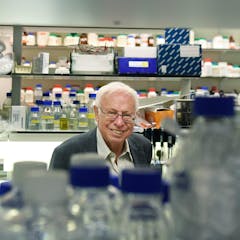
Articles on Biochemistry
Displaying 21 - 40 of 41 articles

Your blood is red;
it’s never blue.
Because of hemoglobin;
and the view through tissue.

Researchers who’ve created a kidney-on-a-chip explain why these kinds of devices are an improvement over traditional ways to test new drugs.

A chemist explains how some molecules in human breast milk help fight infection. Understanding their properties could lead to better infant formulas that share the health advantages of breastfeeding.

Humans have long been trying differentiate themselves from the rest of the biological world. Is it because we’re superior, or just insecure?

The four ingredients for holy incense are listed in the Old Testament, but there was much debate over the origin of one of them – onycha. Scientists think they’ve now confirmed the source.

The technique is helping scientists to look for drugs against the Zika virus.

Inserting a random DNA mishmash into a plant or bacterium directs it to make a novel protein. Sifting through the resulting molecules, researchers may find ones have medical or agricultural uses.

Some people on very low-carb diets say they feel euphoric, have clear minds and lose their appetite. Here’s why.

Sugar is maligned for its effects on our health, but it’s an amazing substance and can be used for more than just making things taste sweet.

A new theory could explain why the key molecules of life - DNA and RNA - only come in one of two possible forms.

Have you ever wondered how the small white ibuprofen pill turns off your headache? Or how a regular antidepressant keeps your brain chemistry in balance?

Study suggests that comets and meteorites could have seeded planets beyond our own solar system with life.

Scientists have discovered the first easy-to-grow bacteria that can break down plastics.

The recipients of this year’s Nobel Prize for Chemistry showed that DNA is far from static. Rather, it is bombarded by damaging forces, but our bodies know how to repair these precious strands.

The origin of life is still an unsolved riddle. How were life’s building blocks first assembled?

Most people avoid venomous creatures, but they can also teach us a lot about chemical reactions that take place outside of the body - or exochemistry.

Scientists and engineers have looked to nature for their inspiration for centuries. The field of biomimetics uses ideas from nature to solve complex human challenges. Synthetic biology, a more recent concept…

Depression, schizophrenia and other psychiatric conditions are increasingly linked to abnormalities in the brain and in our genes. Many professionals believe these developments hold the key to better treatments…

How life came about from inanimate sets of chemicals is still a mystery. While we may never be certain which chemicals existed on prebiotic Earth, we can study the biomolecules we have today to give us…

Many therapeutic drugs and toxins affect us without us knowing exactly how. We know, for example, that Epilim, or sodium valproate, one of the most highly prescribed medicines for epilepsy can prevent…
